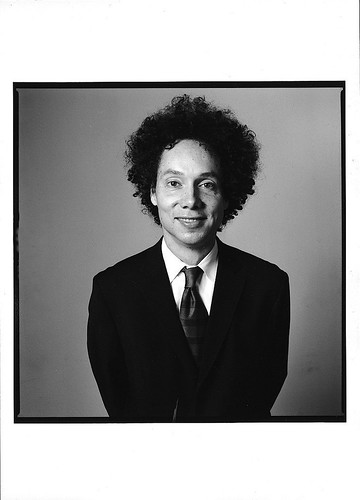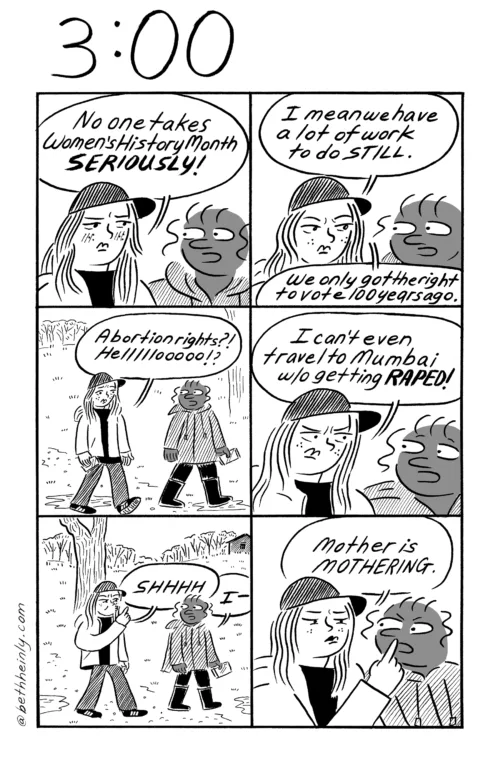
Each year the Free Library author events turn up some nuggets. The talks, which Steve and I attend with our buddies Ed and Ann are like entertainment for the academic set–standup with footnotes. We’ve seen John Updike (post), Atul Gawande, Kazuo Ishiguro (post), Norman Mailer, Jhumpa Lahiri, Louise Erdrich, Calvin Trillin and many more. Best is when the authors are great extemporaneous speakers, as some are. John Updike, Calvin Trillin and, of course, Norman Mailer are (or were, RIP John and Norman) in that group. So is Malcolm Gladwell who we saw Monday night.
Gladwell, the pop culture guru (The Tipping Point, Blink) and New Yorker magazine writer was most entertaining in his 30 minute talk and when fielding questions, a couple of which he said, laughing, that he wouldn’t answer — and didn’t.
Outliers, Gladwell’s new book, talks about human capitalization (ie everyone reaching their highest level of functioning) and how we can raise the cap rate by working against poverty, stupidity and entrenched bad attitudes.
The idea of human capitalization comes from James Flynn (discoverer of the Flynn effect which finds that IQ test scores increase with every generation almost everywhere in the world). Gladwell — who is a masterful synthesizer of ideas using direct language and a vernacular approach to scientific material — took Flynn’s idea about human capitalization and spliced in examples from Michael Lewis‘ The Blind Side (a book about a child lifted from poverty on to a path to success) and from his own experience as a distance runner. His big points are that we have bad attitudes about change that stand in the way of raising up the poor. Notably, he couches this as a moral issue.
“I’m increasingly obsessed with our genetic explanation of things….If you think [math ability or talent at sports] is genetic, that’s pessimistic. What can you do? If you think it’s capitalization [or lack of capitalization] then you can do something. It’s profoundly optimistic. …The poor will always be with us….that’s morally repugnant,” he said.
There is no genetic predisposition that makes some people better able to do math or to win distance races, he argued. And if poverty is taken away, if stupid rules are abandoned and if bad attitudes change, everybody would be better off.
Gladwell, who’s given this talk before (see video clip) lambasted in particular, the rule for the annual age cutoffs for playing youth sports (as well as the age cutoffs for school class enrollments) both of which set one fixed date that winds up favoring children who are older and bigger. Middle class families know to enroll their children so they will be among the oldest in the kindergarten class (or the biggest on the soccer team), and that way their children will be favored and do well, and they will rise to the top. These kids are not naturally smarter or more gifted athletes than their classmates/schoolmates — they just happen to be older and bigger and thus they do better and get on track to be favored for success. Families living in poverty do not use these strategies and thus their children will often be the youngest in the class and the smallest. They will not do as well competing against their bigger and older classmates/teammates and will not be favored by the system. These kids are not less intelligent or less athletically gifted, they’re just (in some cases) 11 months younger than their classmates/teammates and they will never be able to compete fairly.
Gladwell suggests we could change this simply enough by aggregating children in schools/teams by the month of their birth so that all the January birthday kids are together competing against each other — and all the November kids are competing against other November kids.
Someone in the audience asked him for an opinion on what should be covered in President Obama‘s economic stimulus package. Gladwell said we should prioritize, and that the current crisis has been a quick one, quicker than any other crisis, so it’s hard to know. Then, he mentioned the arts and said — without really endorsing the idea — that we could do worse than to increase funding for the arts. “It’s not clear to me that it’s a lesser need than other things we’re throwing money at.”
The audience loved the talk and afterwards Gladwell signed a lot of books.










